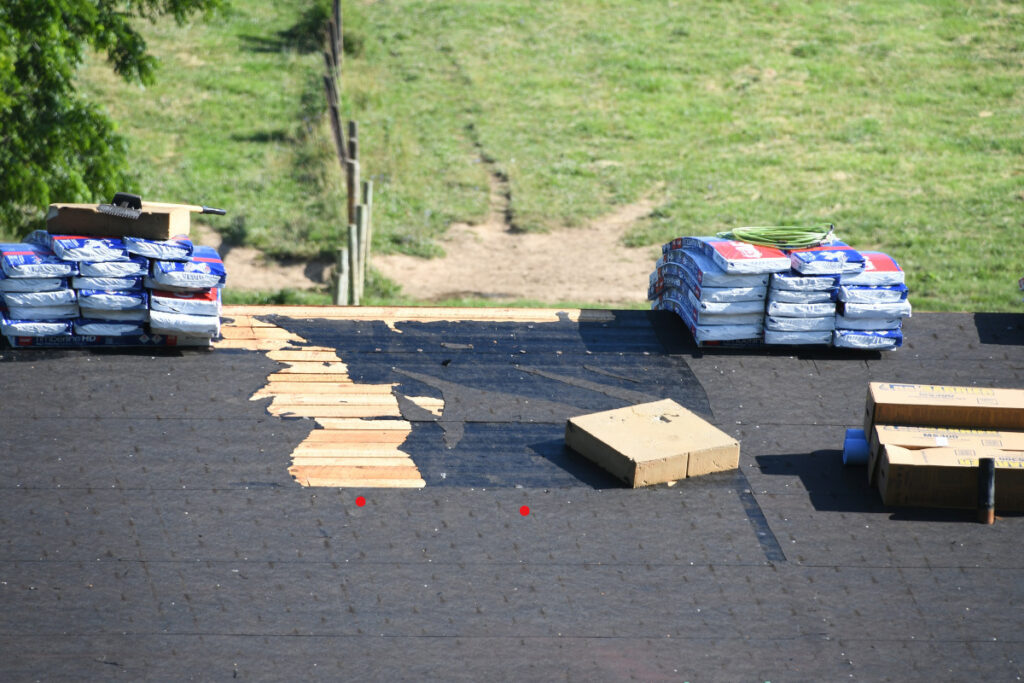Introduction
Choosing the right roof warranty is essential for homeowners looking to protect their investment and avoid costly repairs. With many options available, it can be overwhelming to determine which factors should influence your decision.
In this blog post, we will outline five key elements to consider when selecting the perfect roof warranty for your needs. From coverage duration and types to transferability and contractor track record, we’ll easily guide you through this crucial aspect of home maintenance. So please grab a cup of coffee and continue reading as we help you make an informed choice that could save you thousands!
Understanding A Roof Warranty
A roof warranty safeguards homeowners, ensuring their investment in a new or repaired roofing system is well-protected from potential flaws and failures. These warranties come in various types and cover different aspects of the roofing process, such as materials, workmanship, and installation. Understanding the specifics of each type is essential to make an informed decision when selecting a roof warranty for your home.
As you explore your options in the market, remember that not all warranties are created equal. Some solely cover manufacturer defects relating to the quality or durability of roofing materials used (e.g., solar panels). In contrast, others extend coverage to include issues arising from poor craftsmanship during installation. Understanding these distinctions can help you select robust protection tailored to your unique requirements while keeping unexpected expenses at bay. For example, if you’re considering how many solar panels would be needed for your driving needs (such as charging an electric vehicle), it’s crucial to ensure that both material quality and proper installation are covered by your chosen warranty.
Duration Of Coverage
Consider the length of coverage when selecting a roof warranty – short-term versus long-term warranties and looking at coverage lengths are important factors to consider. To learn more about the types of coverage available, read on.
Short-term Vs. Long-term Warranties
When choosing between short-term and long-term warranties, homeowners must carefully evaluate the benefits and drawbacks of each option. The following table outlines the key differences between short-term and long-term roof warranties:
| Short-term Warranties | Long-term Warranties |
|---|---|
| Typically have expiration periods ranging from 5 to 10 years. | Can promise coverage for up to 50 years or even lifetime. |
| May have lower initial costs compared to long-term warranties. | While initially more expensive, they can provide greater value in the long run. |
| May not cover all types of defects or damages, which can lead to additional expenses. | Usually offer more comprehensive coverage, including both material and workmanship defects. |
| Shorter duration may require homeowners to negotiate a new warranty if issues arise after the warranty period ends. | Long-term warranties provide continuous coverage, reducing the need for future negotiations and potential disruptions. |
| Transferability may be limited or not available, potentially impacting resale value. | Long-term warranties are more likely to be transferable, which can increase the resale value of the home. |
It is essential to weigh the costs and benefits of both short-term and long-term warranties to choose the best option for your specific needs and situation.
Looking At Coverage Lengths
When choosing a roof warranty, one of the key factors to consider is the duration of coverage. Roof warranties come in both short-term and long-term options, with coverage lengths varying depending on the type of warranty you choose. For instance, some workmanship warranties may last for a lifetime, with prorating beginning after a certain number of years, while manufacturer warranties may cover roofing materials for 20 to 50 years.
It’s essential to evaluate your needs and future plans when deciding which option is best for you. If you plan to stay in your home long term, a lifetime workmanship warranty could provide peace of mind knowing that installation errors will be covered indefinitely. On the other hand, if you move or sell your home within the next few years, it may make more sense to opt for a shorter-term warranty that still provides adequate protection during your ownership period. Taking into account how many solar panels or what kind of solar panels are needed and considering different coverage lengths offered by various companies can help homeowners determine which one meets their needs most effectively.
Types Of Coverage
When considering a roof warranty, it is important to understand the different types of coverage available such as material vs. workmanship defects and manufacturer’s warranties vs. contractor warranties.
Material Defects Vs. Workmanship Defects
When choosing a roofing warranty, it’s crucial to understand the difference between material defects and workmanship defects. Material defects refer to issues with the roofing materials, such as faulty shingles, while workmanship defects refer to problems with the installation process, such as improper sealing or flashing. The table below highlights the key differences between material and workmanship defects.
| Material Defects | Workmanship Defects |
|---|---|
| Problems with the manufacturing of the roofing materials | Issues arising from the installation process or techniques used |
| Examples include: faulty shingles, premature granule loss, or warping | Examples include: improper sealing, incorrect flashing installation, or poor ventilation |
| Covered under material warranties | Covered under workmanship warranties, such as contractor workmanship warranties |
| Claiming for material defects requires proof that the issue is a result of manufacturing errors | Claiming for workmanship defects may require proof that installation errors caused the problem |
| Manufacturer warranties typically cover material defects | Contractor workmanship warranties typically cover workmanship defects |
Manufacturer’s Warranties Vs. Contractor Warranties
When choosing a roof warranty, it’s important to understand the differences between manufacturer and contractor warranties. Both types of warranties serve different purposes and offer varying levels of coverage depending on the specific terms and conditions.
| Manufacturer's Warranties | Contractor Warranties |
|---|---|
| Cover the materials used in the roofing project. | Cover the installation or labor performed by the contractor. |
| Usually offered by the manufacturer of the roofing materials themselves. | Typically provided by the contractor who installs the roofing system. |
| Can last longer than contractor warranties, with some offering coverage for up to 50 years or more. | Generally last between 5-10 years, with some offering extended coverage based on specific conditions. |
| Do not cover the installation or workmanship of the contractor. | Do not cover materials, as these are covered separately by manufacturer warranties. |
| May be voided if materials are not installed according to the manufacturer's specifications. | May offer additional protection against installation-related problems, which often go beyond what is covered by the manufacturer's warranty. |
Homeowners often combine both manufacturer’s and contractor warranties to create a more comprehensive “standard roofing warranty.” By doing so, they ensure coverage for both the materials and the workmanship, which can lead to increased peace of mind in the long run.
Inclusions And Exclusions
Understanding the fine print of any warranty is essential to avoid unexpected expenses. Learn about common inclusions and exclusions to look out for and how they can impact your coverage with our detailed guide on choosing a roof warranty. Keep reading to make sure you’re protected against costly repairs!
Common Inclusions And Exclusions To Be Aware Of
When it comes to choosing a roof warranty, there are certain inclusions and exclusions that you need to be aware of. Here are some common ones:
1. Inclusions:
a. Defects in material or workmanship
b. Leaks caused by manufacturing defects or improper installation
c. Repair or replacement costs for covered damages
2. Exclusions:
a. Normal wear and tear
b. Damage caused by natural disasters or extreme weather conditions
c. Damage resulting from negligence, misuse, or lack of maintenance
d. Damage caused by animals or pests
It is crucial to carefully review the warranty document and understand the inclusions and exclusions before making any decisions. This will ensure that you are fully protected against unexpected expenses and not caught off guard by any limitations or exclusions.
Additionally, it is essential to remember that commercial roof warranty inclusions, exclusions, and durations may vary from provider to provider.
Protecting Yourself Against Unexpected Expenses
When choosing a roof warranty, one crucial factor to consider is the inclusions and exclusions related to coverage. Some warranties may cover material defects but exclude workmanship defects, while others may limit the damage they will cover. It’s important to carefully review these conditions before committing to a warranty, as unexpected expenses can arise if these factors still need to be fully understood.
To ensure that you are protected against any potential issues, it’s also essential to choose a roofing contractor who offers their own workmanship warranty coverage. This type of warranty ensures that if there are any problems with the installation or quality of your roof, the contractor will be responsible for fixing it at no extra cost to you. By doing your due diligence and selecting a highly reputable contractor with excellent customer satisfaction ratings, you can rest assured that your investment is well-protected against unforeseen expenses.
In addition to considering the terms of the warranty and choosing a reliable roofing contractor, keeping claim limits and prorated coverage in mind when making your decision is critical. These factors often apply to what is covered under warranty and how much protection you have should something go wrong. By understanding these nuances upfront, you can decide which roof warranty provides the most comprehensive and affordable protection for your home or business.

Claim Limits And Prorated Warranties
Understanding the terms and conditions of claim limits and prorated warranties, including knowing the maximum amount that can be claimed and whether or not coverage depreciates over time, is important.
Understanding Terms And Conditions
The terms and conditions of a roof warranty can be complex and challenging to understand. Reading through the fine print is crucial to fully comprehend what is covered and excluded under your warranty. It’s essential to know the specifics of your coverage, including any limitations or exclusions that may affect your claim.
For example, some warranties may not cover damage caused by natural disasters like hurricanes or earthquakes. Others may exclude damages resulting from improper installation or maintenance on your part. Understanding these terms will ensure you stay aware of unexpected expenses.
In addition to reading the fine print, it’s important to understand the language used in the warranty documentation. Some warranties use industry-specific jargon or legal language that can be confusing for homeowners without roofing experience. Researching unfamiliar terms or reaching out to a trusted contractor for clarification can save you headaches when making a claim under your roof warranty.
Knowing Claim Limits
When choosing a roof warranty, homeowners should pay close attention to the claim limits specified in the contract. Claim limits refer to the maximum amount that can be paid for repairs or replacements under warranty. Understanding these limits is essential to know the protection you’re getting for your investment.
For example, if a homeowner’s roofing system fails due to manufacturer defects and requires $10,000 worth of repair work, but their warranty has a claim limit of $5,000, they will be responsible for covering the remaining $5,000. That’s why choosing a warranty with adequate coverage levels is crucial based on your budget and needs.
It’s also important to note that some warranties may have different claims limits depending on the damage being repaired or replaced. For instance, there may be separate claim limits for material defects versus workmanship defects. Homeowners should ensure they fully understand all aspects of their roof warranty before signing on the dotted line.
Prorated Coverage
When it comes to roofing warranties, prorated coverage is something you should consider. Prorated warranties reduce the amount of money owed based on the age of your roof system. For instance, if your roof fails during year 5 of a 10-year warranty, you may only receive reimbursement for half of the remaining time on your warranty. This means that prorated coverage can save you money in the long run.
However, it’s essential to note that most material-only roofing warranties are prorated after five or ten years, depending on the materials and brand. The upside is that many now include benefits that provide 100% guarantees for the first few years. Additionally, workmanship coverage against installation errors may have lifetime terms with prorated coverage beginning after a certain number of years.
When choosing a roofing warranty with prorated coverage as part of the protection package, consider this type carefully before signing any agreement. Read the terms and conditions thoroughly and familiarize yourself with what’s included or not in the policy. By doing so, you’ll be able to protect yourself against unexpected expenses while still getting fair compensation for potential damages covered under your warranty plan.
Transferability
Consider whether the roofing warranty is transferable and how this may impact your ability to sell your home.
Can The Warranty Be Transferred?
When it’s time to sell your home, the transferability of your roof warranty is an important consideration. Most roofing warranties can be transferred to new homeowners, but some caveats and exceptions exist. It’s always best to check with the manufacturer or contractor before assuming the warranty will transfer automatically.
A roof warranty protects the original homeowner against defects in workmanship or materials for a specified period, but if you sell your home during this time, a transferrable warranty can provide peace of mind for both parties and increase your home’s resale value.
The Impact On Resale Value
One significant factor to consider when choosing a roof warranty is its impact on resale value. A transferable warranty, for instance, can significantly boost the value of your property by making it more appealing to potential buyers. This coverage allows you to transfer the remainder of your warranty to the new owner after selling your home. Since they won’t have to worry about unexpected repair expenses in the future, they’ll be more likely to consider buying your property.
On the other hand, if you don’t have a reliable and comprehensive warranty, potential buyers might hesitate or negotiate lower prices due to uncertainty over maintenance expenses down the road. Shingle warranties can also significantly affect resale value because these are highly visible parts that make up most roofs’ exterior appearance. Homes with aged or damaged shingles may fetch less than those with newer-looking and better-maintained ones.
Ultimately, investing in a quality roof warranty that offers protection against common problems like leaks and material defects can help maintain or even increase your home’s overall resale value in today’s competitive real estate market.

Cost
When choosing a roof warranty, it’s important to weigh the cost against the value of coverage offered, as balancing these factors can help ensure long-term protection for your home. To learn more about how to make this decision, read on!
Balancing Cost And Warranty Coverage
When shopping for a roof warranty, it’s important to consider how much coverage you’ll get for the price. Full-system warranties are more expensive than other types because they cover labor and materials needed to repair leaks. Material warranties generally only cover defects in roofing materials and may not include labor costs. Contractor workmanship warranties typically provide material and labor coverage for repairs but may not cover storm damage or problems caused by improper maintenance.
While choosing the cheapest option available is tempting, it’s important to consider the potential cost of repairs or replacements that the warranty may not cover. For example, a full-system warranty will likely cover any necessary repairs if your roof is damaged in a hailstorm. In contrast, a material warranty would only cover the shingles’ defects. Balancing costs with comprehensive coverage can help protect you from unexpected expenses.
Compare warranties not only based on price, but also on whether they suit your needs. If you live in an area prone to severe weather, paying extra for comprehensive protection may be worth it. But if you have a newer home with high-quality roofing materials and fewer risks, a lower-cost warranty might be the better option.
Importance Of A Reliable Warranty
Having a reliable roofing warranty is crucial when it comes to protecting your investment. A warranty can offer peace of mind that any defects or issues with the roof will be covered without additional expenses. Without a warranty, unexpected repairs or replacements could leave you with significant financial burdens.
When choosing a roofing warranty, consider the cost and value of the coverage. While a lower price may seem appealing, ensuring the coverage is sufficient to protect against potential damages is vital. Also, make sure to review all inclusions and exclusions in detail so that there are no surprises later on.
Another aspect to consider when selecting a reliable roofing warranty is the contractor’s track record. A contractor who has been in business for several years and has a history of quality workmanship is more likely to offer reliable warranties that they stand behind.

Contractor’s Track Record
Consider the length of time a contractor has been in business, the quality of their previous work, and their commitment to customer satisfaction when choosing a roofing warranty.
Length Of Time In Business
When choosing a roof warranty, it’s important to consider the length of time that the contractor has been in business. This is a key factor because it shows their experience level and ability to provide quality service. A roofing company with many years of experience has likely dealt with many roofing issues and knows how to navigate common challenges efficiently.
Choosing an established contractor matters because they’re financially equipped to honor warranties. With an established, reputable company, homeowners have peace of mind knowing that any issues will be taken care of by someone committed and reliable over many years.
Overall, when shopping for roof warranties or services, research companies thoroughly and inquire about their track record within the industry. It’s always helpful to read reviews from past customers or ask friends and family for recommendations. With careful consideration given to factors like length of time in business, you can feel confident when selecting a trustworthy contractor for all your roofing needs.
Quality Of Previous Work
The quality of previous work, a roofing contractor, completes crucial when choosing a roof warranty. Checking out reviews and references from past customers can provide valuable insight into the contractor’s reliability, professionalism, and overall craftsmanship. Additionally, taking the time to see examples of their previous work can give you an idea of what kind of results you can expect for your project.
Proper installation is key to preventing leaks and damage to your home. Do your research, check a contractor’s track record, and ask for references to ensure your investment in a new roof will provide lasting protection. Remember, every roofing company should offer at least some form of warranty. Still, it’s up to you as the homeowner to decide if they have proven their expertise enough through their prior work before signing any agreements or contracts.
Commitment To Customer Satisfaction
When choosing a roofing warranty, it’s essential to consider the contractor’s commitment to customer satisfaction. This can be evidenced through reviews, testimonials, and referrals from previous customers. Look for contractors who prioritize their clients and go above and beyond to ensure they are happy with their work.
Choose reputable roofing contractors with permanent business locations and insurance coverage to handle accidents during installation or repairs. Also, consider their track record of quality work and how long they’ve been in business before making a decision.
Ultimately, choosing a roofing warranty with reliable coverage backed by excellent customer service is crucial in protecting your investment and ensuring peace of mind for years.

Fine Print And Understandability
Homeowners should carefully read the terms and conditions of their roof warranty to ensure they fully understand the coverage and pay close attention to any confusing or ambiguous language used in the agreement.
Reading The Terms And Conditions
Carefully read and understand the terms and conditions of a roof warranty, instead of just relying on the contractor’s word. Pay attention to any exclusions or limitations that may not have been discussed with you during negotiations.
For example, some warranties may seem comprehensive but only cover certain parts of your roof or specific types of damage. Other fine print details could include prorated coverage, which means that after a particular time, you’ll be responsible for covering part of any repairs yourself. By being aware of these factors upfront, you can choose a warranty that offers maximum protection without leaving anything out.
Finally, ensure that all language used in the terms and conditions is clear and easy to understand so there are no misunderstandings later on. Ask questions before signing on the dotted line if something needs to be clarified or clarified. Understanding all aspects of your roof warranty will help give you peace of mind for years knowing that your investment is fully protected.
Understanding The Language Used
One of the factors that homeowners should consider when choosing a roof warranty is understanding the language used in the agreement. This means reading and comprehending all the terms and conditions of the warranty document. The fine print may contain crucial information that can make or break your coverage. For example, some warranties only cover specific roofing materials, while others exclude damages caused by natural disasters such as hurricanes, hailstorms, or earthquakes.
It’s also important to note that roofing industry jargon can confuse most homeowners. To avoid misunderstandings and confusion, it’s best to ask questions about any words or phrases you need help understanding. Furthermore, some unscrupulous contractors may use technical terms to hide exclusions in their contracts. As such, understanding the language used ensures you know what parts of your roof warranty are included and excluded from coverage.
Ultimately, taking time to read through and understand all aspects of a roof warranty is vital before deciding which one to choose for your home’s protection. Doing so helps protect against unexpected expenses due to missed details hidden in contract jargon.
Conclusion
Choosing the right roof warranty that meets your needs is essential. Consider factors such as duration of coverage, types of defects covered, inclusions and exclusions, claim limits, transferability, cost versus value, and the contractor’s track record. Be sure to read the fine print of any warranty carefully before signing up.
Remember that a manufacturer or installer warranty may not cover all aspects of roofing repairs or replacements. In some cases, defects can be caused by improper installation rather than faulty materials. By understanding these factors when choosing a roof warranty, you can ensure peace of mind knowing you’re protected against unexpected expenses and have a dependable solution for any potential issues with your home’s most critical component—the roof! Look for warranties that include workmanship guarantees from experienced contractors who prioritize customer satisfaction.
DroneQuote as your solar partner
Looking for a reliable and efficient way to go solar? DroneQuote is the solution you’ve been looking for! As your solar fiduciary, we’ll help you compare the best solar quotes from top-rated installers in your area. Don’t miss out on the opportunity to save money on your energy bills and reduce your carbon footprint. Sign up with DroneQuote today and let us guide you towards a brighter future with solar energy.

FAQs:
1. What are the factors to consider when choosing a roof warranty?
The five factors to consider when selecting a roof warranty include coverage length, exclusions and limitations, transferability, wind speed rating, and contractor certification requirements.
2. How long should my roof warranty last?
The coverage length of your roof warranty depends on various factors, such as the type and quality of roofing material used. Choosing a warranty that covers at least 20-30 years is recommended.
3. Is it important for my roofing contractor to be certified by the manufacturer before choosing a warranty?
Yes, the manufacturer must certify your roofing contractor before opting for a warranty. This ensures they have received proper training from the manufacturer in installation techniques specific to their products.
4. Can I transfer my roof warranty if I sell my property?
Most warranties offer transferability options but may come with certain restrictions or fees. Understand roof insurance policy details before transferring during property transactions or ownership changes.
